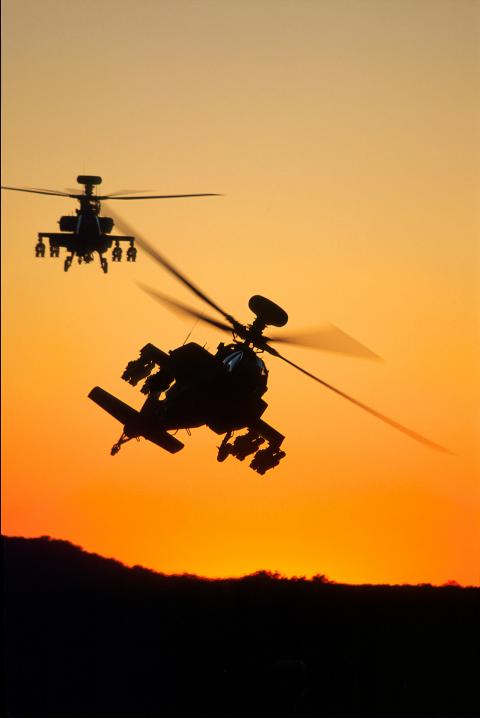The Taiwanese army earlier this year took delivery of the first of 30 Apache combat helicopters from the US and next month pilots and crew will begin training on the platform, which recently received a new designation from the US Army.
As a result of the significant upgrades made to the AH-64D Block III Apache during its development, the US Army recently decided to re-designate it the E model. To date, 25 AH-64Es have been delivered to the US Army and Taiwan received its first delivery during a low-key handover ceremony at Boeing Co’s Mesa facilities in Arizona in May.
According to Aviation Week, training for Taiwanese pilots and crews is expected to begin next month.

Photo courtesy of Boeing Co.
Following approval by the US government in August of contracts for full production of the helicopter, Boeing is now building four AH-64Es per month for the US Army, which plans to buy a total of 690, and three for foreign military sales (FMS). The US has also notified Congress for the sale of eight AH-64Es to Indonesia, 22 to Qatar and 22 to India, the latter under a non-FMS “hybrid” agreement.
If tests at the Naval Air Station China Lake in California last year are any indication, Taiwan’s AH-64E will be a far more formidable combat helicopter than its predecessors. During the drills, the E model reportedly countered realistic air defense threats and was able to maintain its position, unlike the Block II Apaches, which was “shot down” in similar exercises.
“The Block III absolutely frustrated these folks that operate these [air defense] systems,” Colonel John Lynch, attack helicopter manager at Army Training and Doctrine Command, told Aviation Week.
This was partly due to the aircraft’s ability to operate at lower altitudes and thus evade radar systems arrayed against it.
Part of the Echo model’s advantages are its improved composite main rotor blades, which are 15cm longer than those used on older models, as well as a new tip design and General Electric T700-GE-701D engines, all of which give the aircraft improved aerodynamic performance.
The AH-64Es’ new power-to-weight ratio also makes it safer for operations at low-levels and gives it a performance similar to that of the AH-64A, which was significantly lighter than the AH-64D Block II model, Lynch told Shephard Media, a defense and aerospace publication.
Taiwan’s 30 Apache helicopters, administered under a program named “Sky Eagle,” were included in an October 2008 notification to US Congress for about US$2.5 billion. Full delivery of the multirole attack helicopters is expected to be completed in 2017.

ANOTHER EMERGES: The CWA yesterday said this year’s fourth storm of the typhoon season had formed in the South China Sea, but was not expected to affect Taiwan Tropical Storm Gaemi has intensified slightly as it heads toward Taiwan, where it is expected to affect the country in the coming days, the Central Weather Administration (CWA) said yesterday. As of 8am yesterday, the 120km-radius storm was 800km southeast of Oluanpi (鵝鑾鼻), Taiwan’s southernmost tip, moving at 9kph northwest, the agency said. A sea warning for Gaemi could be issued tonight at the earliest, it said, adding that the storm is projected to be closest to Taiwan on Wednesday or Thursday. Gaemi’s potential effect on Taiwan remains unclear, as that would depend on its direction, radius and intensity, forecasters said. Former Weather Forecast

As COVID-19 cases in Japan have been increasing for 10 consecutive weeks, people should get vaccinated before visiting the nation, the Centers for Disease Control (CDC) said. The centers reported 773 hospitalizations and 124 deaths related to COVID-19 in Taiwan last week. CDC Epidemic Intelligence Center Director Guo Hung-wei (郭宏偉) on Tuesday said the number of weekly COVID-19 cases reported in Japan has been increasing since mid-May and surpassed 55,000 cases from July 8 to July 14. The average number of COVID-19 patients at Japan’s healthcare facilities that week was also 1.39 times that of the week before and KP.3 is the dominant

The Chinese Communist Party’s (CCP) working group for Taiwan-related policies is likely to be upgraded to a committee-level body, a report commissioned by the Mainland Affairs Council (MAC) said. As Chinese President Xi Jinping (習近平) is increasingly likely to upgrade the CCP’s Central Leading Group for Taiwan Affairs, Taiwanese authorities should prepare by researching Xi and the CCP, the report said. At the third plenary session of the 20th Central Committee of the CCP, which ended on Thursday last week, the party set a target of 2029 for the completion of some tasks, meaning that Xi is likely preparing to

US-CHINA TRADE DISPUTE: Despite Beijing’s offer of preferential treatment, the lure of China has dimmed as Taiwanese and international investors move out Japan and the US have become the favored destinations for Taiwanese graduates as China’s attraction has waned over the years, the Ministry of Labor said. According to the ministry’s latest income and employment advisory published this month, 3,215 Taiwanese university graduates from the class of 2020 went to Japan, surpassing for the first time the 2,881 graduates who went to China. A total of 2,300 graduates from the class of 2021 went to the US, compared with the 2,262 who went to China, the document showed. The trend continued for the class of 2023, of whom 1,460 went to Japan, 1,334 went to